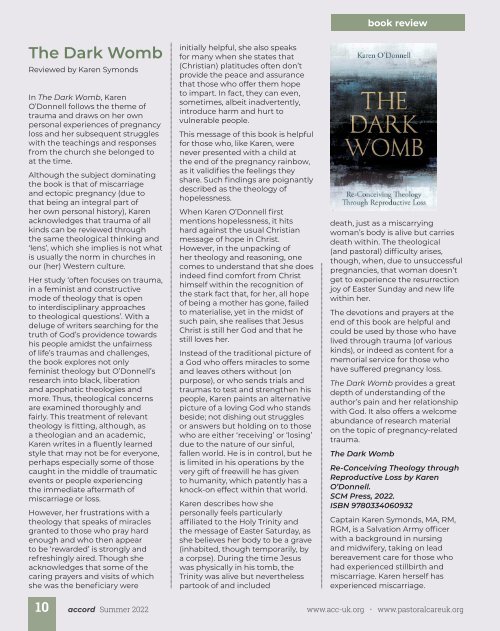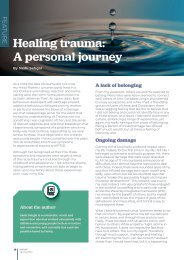ACC E-Accord Summer 2022
Create successful ePaper yourself
Turn your PDF publications into a flip-book with our unique Google optimized e-Paper software.
ook review<br />
The Dark Womb<br />
Reviewed by Karen Symonds<br />
In The Dark Womb, Karen<br />
O’Donnell follows the theme of<br />
trauma and draws on her own<br />
personal experiences of pregnancy<br />
loss and her subsequent struggles<br />
with the teachings and responses<br />
from the church she belonged to<br />
at the time.<br />
Although the subject dominating<br />
the book is that of miscarriage<br />
and ectopic pregnancy (due to<br />
that being an integral part of<br />
her own personal history), Karen<br />
acknowledges that trauma of all<br />
kinds can be reviewed through<br />
the same theological thinking and<br />
‘lens’, which she implies is not what<br />
is usually the norm in churches in<br />
our (her) Western culture.<br />
Her study ‘often focuses on trauma,<br />
in a feminist and constructive<br />
mode of theology that is open<br />
to interdisciplinary approaches<br />
to theological questions’. With a<br />
deluge of writers searching for the<br />
truth of God’s providence towards<br />
his people amidst the unfairness<br />
of life’s traumas and challenges,<br />
the book explores not only<br />
feminist theology but O’Donnell’s<br />
research into black, liberation<br />
and apophatic theologies and<br />
more. Thus, theological concerns<br />
are examined thoroughly and<br />
fairly. This treatment of relevant<br />
theology is fitting, although, as<br />
a theologian and an academic,<br />
Karen writes in a fluently learned<br />
style that may not be for everyone,<br />
perhaps especially some of those<br />
caught in the middle of traumatic<br />
events or people experiencing<br />
the immediate aftermath of<br />
miscarriage or loss.<br />
However, her frustrations with a<br />
theology that speaks of miracles<br />
granted to those who pray hard<br />
enough and who then appear<br />
to be ‘rewarded’ is strongly and<br />
refreshingly aired. Though she<br />
acknowledges that some of the<br />
caring prayers and visits of which<br />
she was the beneficiary were<br />
initially helpful, she also speaks<br />
for many when she states that<br />
(Christian) platitudes often don’t<br />
provide the peace and assurance<br />
that those who offer them hope<br />
to impart. In fact, they can even,<br />
sometimes, albeit inadvertently,<br />
introduce harm and hurt to<br />
vulnerable people.<br />
This message of this book is helpful<br />
for those who, like Karen, were<br />
never presented with a child at<br />
the end of the pregnancy rainbow,<br />
as it validifies the feelings they<br />
share. Such findings are poignantly<br />
described as the theology of<br />
hopelessness.<br />
When Karen O’Donnell first<br />
mentions hopelessness, it hits<br />
hard against the usual Christian<br />
message of hope in Christ.<br />
However, in the unpacking of<br />
her theology and reasoning, one<br />
comes to understand that she does<br />
indeed find comfort from Christ<br />
himself within the recognition of<br />
the stark fact that, for her, all hope<br />
of being a mother has gone, failed<br />
to materialise, yet in the midst of<br />
such pain, she realises that Jesus<br />
Christ is still her God and that he<br />
still loves her.<br />
Instead of the traditional picture of<br />
a God who offers miracles to some<br />
and leaves others without (on<br />
purpose), or who sends trials and<br />
traumas to test and strengthen his<br />
people, Karen paints an alternative<br />
picture of a loving God who stands<br />
beside; not dishing out struggles<br />
or answers but holding on to those<br />
who are either ‘receiving’ or ‘losing’<br />
due to the nature of our sinful,<br />
fallen world. He is in control, but he<br />
is limited in his operations by the<br />
very gift of freewill he has given<br />
to humanity, which patently has a<br />
knock-on effect within that world.<br />
Karen describes how she<br />
personally feels particularly<br />
affiliated to the Holy Trinity and<br />
the message of Easter Saturday, as<br />
she believes her body to be a grave<br />
(inhabited, though temporarily, by<br />
a corpse). During the time Jesus<br />
was physically in his tomb, the<br />
Trinity was alive but nevertheless<br />
partook of and included<br />
death, just as a miscarrying<br />
woman’s body is alive but carries<br />
death within. The theological<br />
(and pastoral) difficulty arises,<br />
though, when, due to unsuccessful<br />
pregnancies, that woman doesn’t<br />
get to experience the resurrection<br />
joy of Easter Sunday and new life<br />
within her.<br />
The devotions and prayers at the<br />
end of this book are helpful and<br />
could be used by those who have<br />
lived through trauma (of various<br />
kinds), or indeed as content for a<br />
memorial service for those who<br />
have suffered pregnancy loss.<br />
The Dark Womb provides a great<br />
depth of understanding of the<br />
author’s pain and her relationship<br />
with God. It also offers a welcome<br />
abundance of research material<br />
on the topic of pregnancy-related<br />
trauma.<br />
The Dark Womb<br />
Re-Conceiving Theology through<br />
Reproductive Loss by Karen<br />
O’Donnell.<br />
SCM Press, <strong>2022</strong>.<br />
ISBN 9780334060932<br />
Captain Karen Symonds, MA, RM,<br />
RGM, is a Salvation Army officer<br />
with a background in nursing<br />
and midwifery, taking on lead<br />
bereavement care for those who<br />
had experienced stillbirth and<br />
miscarriage. Karen herself has<br />
experienced miscarriage.<br />
10 accord <strong>Summer</strong> <strong>2022</strong> www.acc-uk.org • www.pastoralcareuk.org



